About this article
Modafinil is an officially approved drug for disorders that cause excessive sleepiness like narcolepsy. However, modafinil is increasingly prescribed off-label for depression, schizophrenia, ADHD, multiple sclerosis, and other diseases affecting the brain.
Why is modafinil being repurposed for so many conditions, and how do patients stand to benefit?

One reason is that pushing a drug through the FDA approval process is notoriously expensive. The estimated cost of bringing a drug to market in the United States far exceeds one billion dollars [1]. Given this high barrier to entry, clinicians are always looking to repurpose existing drugs.
But the fact that Modafinil & Armodafinil (sold online as Modalert, Modvigil, Waklert & Artvigil) is being tested for so many different conditions also reflects modafinil’s merits. Modafinil strongly increases wakefulness and vigilance, its side effect profile is extremely mild, and it has a wide therapeutic window. (A wide therapeutic window just means that the toxic dose is much greater than the therapeutic dose, so there’s a healthy margin of safety).
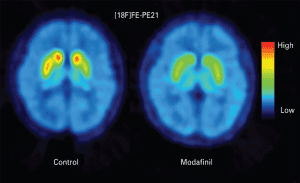
In this article, I’ll review modafinil’s use for depression, anxiety disorders, ADHD, ADD, narcolepsy, and multiple sclerosis. If you suffer from one of these conditions, read onward to learn more about modafinil’s benefits as an off-label treatment.
Modafinil Brief Background
Modafinil is gaining traction among a certain demographic: male millennials who tend to be entrepreneurs, college students, or computer scientists. Modafinil packs the same punch as Adderall, minus the the smorgasbord of ill health effects. Whereas Adderall may be neurotoxic, modafinil likely exerts neuroprotective and neurorestorative effects in the brain.
Modafinil was originally developed to treat sleep disorders like narcolepsy. More recently, clinicians have been testing its effectiveness for disorders where fatigue is prominent, like multiple sclerosis, fibromyalgia, depression, and even schizophrenia-induced cognitive deficits [2].

Only recently has the mainstream media recognized modafinil as a “smart drug”. However, modafinil has actually been around for a long time (over 17 years in fact). It was developed in France in the 1970s. Since its discovery, modafinil’s mechanism of action has remained elusive. The consensus is that many neurotransmitters in the brain are at play, including: GABA, glutamate, histamine, orexin, dopamine, norepinephrine and even gap junctions.
Despite this ambiguity, the net effect is clear: enhanced wakefulness, mental vigilance, and cognitive performance. However, individuals who perform well at baseline may hit a ceiling and derive little benefit from modafinil [3] (see: Cognitive effects of modafinil in student volunteers may depend on IQ).
Modafinil for Anxiety
The effect of modafinil on anxiety is a double-edged sword. On the one hand, modafinil exacerbates anxiety in some users. This makes some sense, in light of its stimulating effects.

Here’s one Reddit user who developed anxiety from modafinil after taking the drug for a few months:
“Hey, I’ve been taking Modalert since 2 months now. I take a dosage of 200mg twice in a week right after I wake up around 9am and start working at my home office. However today I got up late around 1pm and took one 200mg(last dose was 4 days ago) This is the first time I’m experiencing an anxiety attack after taking modalert, I tried calming myself down tried meditating but it keeps coming back. Right now this feeling is really shitty, I only feel like smoking cigarettes. Any of you’ll had experience like this before? Any advice is appreciated.”
So is modafinil anxiogenic (anxiety promoting)?, It depends.
Contrary to the previous report, there’s reason to think modafinil is helpful for the treatment of social anxiety. One case report in the American Journal of Psychiatry describes a woman whose social phobia resolved with modafinil treatment [4].
Social anxiety, at its core, is a compulsive preoccupation with how you’re being evaluated by others. This hypervigilance about how you’re coming across ironically makes it harder to socialize.
There’s an important link between dopamine and social confidence. It tends to be the case that increasing dopamine also increases social confidence, interest in conversations, and assertiveness [5]. That’s why amphetamines like Adderall can be paradoxically used off-label for social anxiety. It’s also why psychostimulants actually reduce anxiety in individuals with ADHD. (The other factor here is that stimulants have a calming effect in patients with ADHD, whereas “normal” individuals are more likely to become overstimulated and anxious from stimulants.)
Like amphetamine, modafinil is also dopaminergic (but to a much lesser extent). It’s a weak dopamine reuptake inhibitor. (Recall that inhibiting dopamine reuptake increases dopamine outside of cells, which activates neurons).

To summarize: modafinil alleviates anxiety by affecting dopamine levels, which increases self-confidence and assertiveness. Modafinil also enhances motivation, and so if your anxiety is apathy-related, it may be helpful in this context.
My personal experience has been that modafinil lowers my anxiety levels if I have performance anxiety. That’s because, well, I perform better with modafinil in my system, and so I have more confidence in my abilities.
Modafinil for Depression
In this section, I’ll provide some background information about depression and how it’s treated, and then discuss modafinil as a novel drug that can be taken along with antidepressants to enhance their effectiveness.
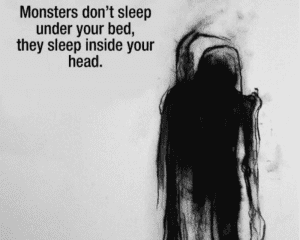
Residual Symptoms of Depression
Antidepressants are only modestly effective.
A third of patients suffering from depression receive little to no benefit from antidepressant use even when combined with counseling [6]. It’s also interesting that antidepressants aren’t more effective than placebos for mild depression. Antidepressants only seem to perform better than placebo for moderate-to-severely depressed patients, possibly because these patients are less susceptible to the placebo effect.
Among patients who do respond to antidepressants, many experience residual cognitive symptoms. Depression leaves a lasting (but mostly reversible) mark on the brain that persists even when mood improves. Residual symptoms of depression include circadian rhythm disturbances, insomnia, fatigue, cognitive deficits, and slow cognitive tempo.
These residual symptoms are an enormous burden to society and may contribute to a relapse of depression.
Modafinil and Depression: The Science & User Reports
Modafinil has been tested as an “antidepressant augmentation agent” in depressed patients with promising results. (An augmentor is just a drug that’s added to a typical antidepressant – like SSRIs – to further alleviate depression).
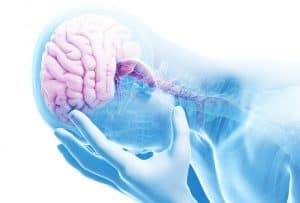
Since modafinil influences several neurotransmitter systems and is also a “smart drug”, modafinil has the potential to address both the cognitive and mood symptoms of depression.
The beneficial effect of modafinil was revealed in a retrospective study where researchers monitored drug response in patients with treatment-resistant depression (TRD). The effects of modafinil among the subjects was assessed using different measures [7].
The authors reported that both modafinil monotherapy and combined antidepressant + modafinil treatment improved depressive symptoms. This indicates that modafinil treatment may have beneficial effects in depressed patients who are unresponsive to the usual therapeutic regimen.
One redditor gave a nice summary of the antidepressant effects of modafinil:
“Two months ago, when I was suffering from a very severe case of clinical depression and researching anti-depressants, I stumbled upon a few convincing case-studies involving using modafinil in tandem with antidepressants. The studies revealed substantial increases in mood and decreases in the severity of the symptoms (I’ll link these below). I showed the studies to my doctor and she was convinced and wrote me a prescription.
After taking 100mg daily over the past two months, the quality of my life has dramatically improved. Because of my increased concentration and energy, I’ve managed to perform at my usual non-depressed level, which has dramatically increased my self-esteem and confidence. This has afforded me the ability to enjoy life from time to time and to look forward to the future. I’m still somewhat depressed but I actually feel like a normal person and my state of my mind was improving at a linear rate up until last week. “
In short: I believe that modafinil could be a very effective treatment option for fighting depression. I wouldn’t generalize my experience to others because my depression was clearly not chemical, it was caused by life-events that destroyed my sense of self-worth and dignity. These events left me feeling hopeless. With a little focus and energy, I managed to overcome this irrationality.”
My Experience with Modafinil and Depression
Having experienced bouts of depression myself, I can attest to the benefits of modafinil.

One thing you need to understand about conventional antidepressants (especially SSRIs) is that they don’t elevate mood so much as they take the edge off the lows. Often antidepressants help you cope by making you more apathetic and less sensitive to the things that previously made you depressed. In fact, there are many case reports of antidepressant-induced apathy, indifference, and “hypofrontality” [8]. In my view, taking a drug to simply care less isn’t an ideally treatment for depression. Ideally, an antidepressant would elevate mood (without making you feel irrationally euphoric).
Modafinil is particularly helpful for depressed individuals because it actually elevates mood if your baseline happiness is low. Plus. modafinil reverses that sense of anhedonia (lack of pleasure), restoring motivation and interest in activities you used to find enjoyable. In this respect, modafinil is similar to the antidepressant buproprion (Wellbutrin); both have dopaminergic effects. And unlike SSRIs, both buproprion and modafinil aren’t associated with that pernicious sense of indifference and apathy.
Modafinil for Attention Deficit Hyperactivity Disorder (ADHD)
Modafinil is a promising alternative to traditional psychostimulants like Ritalin and Adderall for patients with ADHD. Actually, that’s an understatement. Modafinil is quickly becoming the par excellence of ADHD treatments.
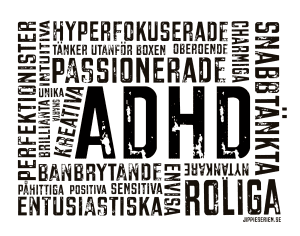
There’s a vast number of online reports touting the benefits of modafinil for ADHD. A simple Google search for “modafinil ADHD benefits” returns hundreds of anecdotal reports attesting to the beneficial effects of modafinil. Psychostimulants like Adderall are also effective, but they “burn the candle at both ends” and have many unwanted side effects. This has led many ADHD sufferers to embrace modafinil as a better Adderall alternative.
Why Modafinil Helps ADHD Sufferers
Modafinil’s ability to improve concentration, executive function, vigilance, and wakefulness makes it a good candidate for ADHD sufferers. One study [9] compared the efficacy of d-amphetamine to modafinil for the treatment of ADHD, and found that both medications improved scores on the DSM-IV ADHD checklist (p < 0.001). The authors concluded that “modafinil may be a viable alternative to conventional stimulants for the treatment of adults with ADHD.”
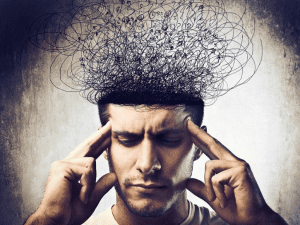
A more recent review by Turner [10] suggests that modafinil consistently improves symptoms of ADHD and is well-tolerated. The most common side effects were insomnia, headache, and decreased appetite. Turner argued that “modafinil may have advantages over current therapies for ADHD in that it can be administered once daily and has fewer reinforcing properties than traditional stimulants” [10].
Despite clear evidence for benefit, modafinil remains unapproved by the FDA for the indication of ADHD. Even so, modafinil is increasingly being prescribed off-label for this purpose.
Why isn’t modafinil officially approved, given its widely recognized benefits in patients with ADHD? The lack of FDA approval for ADHD is most likely politically and economically motivated. Since Cephalon’s patent for modafinil expired in 2010, and so there was no reason for the pharmaceutical company to seek FDA approval for new indications.
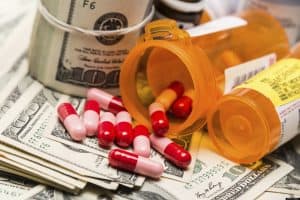
Expensive healthcare
The mechanism underlying modafinil’s therapeutic benefits in patients with ADHD is related to increased dopamine activity in the brain. Researchers have long linked ADHD with low dopamine levels and alterations in the dopamine receptor or its expression [11]. Too little dopamine makes you hyperactive and unable to concentrate because it’s dopamine that keeps your brain stimulated and engaged with an activity. That’s why ADHD is considered a “reward deficiency syndrome.”
Another plausible mode of action is the ability of modafinil to influence a peptide known as hypocretin (also known as orexin). Hypocretin is localized in the hypothalamus and other brain regions that regulate arousal. Modafinil activates hypocretin which plays a role in increasing norepinephrine, dopamine, and histamine levels elsewhere in the brain.
Reviews of modafinil for ADHD are overwhelmingly favorable. NewlyOCD is one of many Reddit users that have described the beneficial effects of modafinil on ADHD sufferers:
“Look at me, I think I’m interesting enough for an AMA!
About 6 months ago I started taking Modafinil to see how it would affect my ADHD. After the first month of taking it semi-regularly I decided that I had decided that I was going to perpetually self-medicate.
Since then I’ve lost 35 pounds, and quit drinking (5 months now).
I read books now, one every week or two, and I could never keep focused long enough to do that before.
I now start AND FINISH projects! I just finished stripping, sanding, and painting my bicycle with a custom frame.
It’s like it turns “I should” into “I am currently doing”.
Many more changes I’m sure will come out in the answers to your questions. AMA!”
Modafinil for Attention Deficit Disorder (ADD)
There are three types of ADHD: inattentive, hyperactive-impulsive, and combined. This distinction isn’t clinically very relevant because all types respond to psychostimulants like Adderall. More research is needed, but if modafinil treats the inattentive symptoms of ADHD, it’s also likely that modafinil will benefit patients with the hyperactive-impulsive and combined subtypes of the disorder. There’s significant overlap between these specific types of ADHD.

One member of the online community TotallyADDConnect commented:
“Prozac brought about a phenominal change in me (1994)… In retrospect, now that I have retired, I see my painful pattern of ADD behavior throughout my life and career. Provigil has brought a similiar profound change once it was finally prescribed. this fall. I am 70 years old and a retired social worker. The diagnosis was an ‘ AHA’ moment. for me…I have a quality of life now, instead of attributing all symptoms to aging..”
Modafinil’s ability to increase catecholamines and facilitate communication between neurons (via gap junctions) underlies its benefits in patients with both inattentive (ADD) and hyperactive (ADHD) subtypes.
Modafinil and Sleep Disorders

Modafinil for Narcolepsy
Modafinil is currently FDA-approved for the treatment of narcolepsy. There’s no doubt that it’s effective for this indication. In this section, I’ll review modafinil as a treatment for narcolepsy and consider what the optimal modafinil dosage is for this disorder. I’ll also discuss tolerance to modafinil’s therapeutic effects and arm you with some actionable tips about how to reset your tolerance.
Remember that modafinil is a eugeroic or wakefulness-promoting agent? Since one of the core symptoms of narcolepsy is chronic sleepiness, it makes sense that modafinil would be beneficial for these patients. But how beneficial? That’s what we’ll consider next in the review of modafinil for narcolepsy.

Modafinil Narcolepsy Review
Modafinil has virtually replaced Ritalin and Adderall as the first-line agent to treat excessive daytime sleepiness [12]. The evidence for benefit is strong, which is no surprise given that it’s officially approved for narcolepsy. Here’s one commenter’s experience with modafinil:
“I have taken Provigil for 5 years now (since I was 16) 400 mgs a day, as the lower dosage was ineffective. It has been a Godsend. I really struggled through school, and whilst it didn’t help me get top grades, it did wonders for keeping me awake during lessons. I’m awake for around 15 hours a day, with a 2 hour nap in the afternoon and 7 hours sleep at night. The best part is being able to have a sleep pattern, something which beforehand, I could never experience. Without this drug I couldn’t never get anything done.”
Modafinil has an average review of 7.3 The most common complaint seems to be that it can lose effectiveness over time, though many users also reported that modafinil was just as effective as when they first took it.
It’s important to recognize that modafinil isn’t a disease-modifying drug for narcolepsy: it only treats the symptoms. Most researchers now think that narcolepsy is actually an autoimmune disease [13]. Immune cells in the brain attack and damage orexinergic neurons (these neurons unsurprisingly synthesize and release orexin). Orexin is involved in maintaining wakefulness; too little orexin and you’ll spontaneously begin to nod off.

Modafinil itself promotes orexin release, which normalizes excessive sleepiness in narcoleptics (and can make you feel “hyperaroused” if you’re healthy and don’t have narcolepsy).
Modafinil doesn’t address other symptoms of narcolepsy, like cataplexy, sleep paralysis, or disturbances in rapid eye movement (REM) sleep. Thus, many patients with narcolepsy may need to take a cocktail of drugs to manage all of their symptoms.
Modafinil for Narcolepsy: Tolerance
Tolerance to the effects of a drug is the body’s way of adapting to regain homeostasis (return to its normal state). The technical term for this phenomena is tachyphylaxis. When a receptor is saturated with too much of a neurotransmitter or hormone, it becomes less sensitive to it. These are “built in” mechanisms that allow the body to self-regulate.
If you become tolerant to the effects of modafinil, it means you’ll need larger doses to achieve the same effect. It’s easy to see how tolerance goes hand-in-hand with drug addiction. But this is not always the case; modafinil is not considered addictive, which is why it’s preferred over psychostimulants like Adderall. Modafinil’s low abuse potential is evident from the fact that it’s a schedule IV drug, whereas drugs like Adderall and Xanax are schedule II.

People with narcolepsy have reported developing tolerance to the effects of modafinil. In fact, this issue is discussed at length in this TalkAboutSleep thread. I’ll quote the executive summary here:
- When Provigil stops working for you, try taking 1-3 days off from the drug.
• Alternatively, try lowering your dosage to 75% of what you found originally effective.
• Taking more Provigil doesn’t usually solve the problem in the long term.
• Don’t take more than 600 mg/day. If you’re taking more than 400 mg/day, monitor your blood pressure
Though I don’t have narcolepsy, I’ve personally taken modafinil for many days consecutively without ever developing tolerance. A person’s genetics plays a role in their susceptibility to developing tolerance (see: A DNA element regulates drug tolerance and withdrawal in Drosophila).
Modafinil for Narcolepsy: Dosage
The official package insert for modafinil recommends a dosage of 200 mg for narcolepsy. It was originally thought that doses above 200mg aren’t more effective and may worsen side effects.
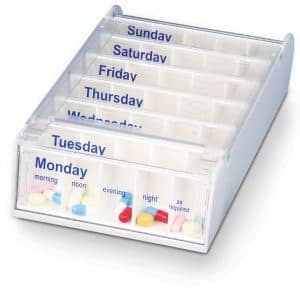
However, a recent study led by Hughes RJ et al found that 400 mg in two divided doses was more effective than both 200 mg and 400 mg (taken once daily). The authors concluded, “A split-dose 400-mg regimen may be superior to once-daily dosing for sustaining wakefulness throughout the entire waking day” [14].
Whether it’s best to take 200mg or 400mg to treat your narcolepsy depends on how sensitive you are to the effects of the drug. This is one instance where the doctor doesn’t necessarily know best – the optimal dose should be titrated based on your individual response to the drug.
Modafinill for Sleep Apnea
Sleep apnea can go unrecognized by doctors for many years. It’s very easy to have sleep apnea and not be aware of it, since the apneic episodes where you stop breathing occur while you’re asleep. For this reason, your significant other may recognize your sleep apnea before you do.
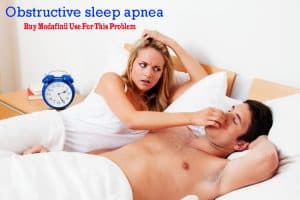
Sufferers of sleep apnea have fragmented sleep that just isn’t as restorative as it should be. They’ll sleep for an interval of time, stop breathing, and then the medulla oblongata and pons (the respiratory centers in the brain) will rouse the rest of the brain just enough to resume breathing. The result is sleep that is fragmented when it should be consolidated.
The effects of sleep apnea are excessive daytime sleepiness, difficulty concentrating, and a slew of other cognitive problems. People with sleep apnea tend to be male, overweight, and have thick necks. (Having a thick neck increases the risk of having obstructive sleep apnea, where your throat muscles intermittently relax.)
A number of studies [15] have reported that modafinil is beneficial and well-tolerated in patients with sleep apnea, especially as an adjunct to nasal continuous positive airway pressure.
Marshall’s 2014 study concluded that “Modafinil significantly improved subjective sleepiness in patients with untreated mild to moderate OSA. The size of this effect is clinically relevant at 3-4 ESS points of improvement compared with only 1-2 points in CPAP clinical trials. Driving simulator performance and reaction time also improved on modafinil.” [16].
Modafinil for Multiple Sclerosis (MS)
Like narcolepsy, multiple sclerosis (MS) is also an autoimmune disease. MS is progressive, and is caused by immune cells that attack the myelin sheath surrounding axons. Axons carry signals in the brain from neuron to neuron. They’re ensheathed with myelin because this insulation increases nerve conduction speed. Take away the myelin, and signals are propagated much more slowly.
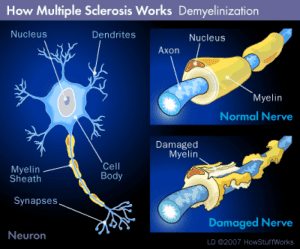
MS can be frighteningly difficult to diagnose, because the symptoms are heterogeneous and overlap with many other diseases.
One of the most common and debilitating symptoms associated with multiple sclerosis (MS) includes fatigue. Fatigue can be described as tiredness that is simply not relieved by sleep. Individuals suffering from fatigue characterize this condition as a chronic and pervasive lack of energy; the entire body feels exhausted all of the time.
About 80% of patients with MS complain of fatigue [17]. This symptom may be linked with sleep disturbances and underlying depression due to the nature of the disease itself (particularly during an episode). MS is relapsing-remitting, meaning that there are exacerbations interspersed with periods of remission.
Modafinil has been tested in patients with MS, with positive preliminary results. Maida EM’s 2002 study [17] concluded that modafinil “significantly improves fatigue and sleepiness and is well tolerated by patients with depression.”
Ysim, a Reddit user, remarked: “I have MS and i take it, it’s really helpful. My neuro was the one who suggested it; I was reticent to try it at first, but the fatigue just got too intense. So I tried it, and have been on it for a year now. It really helps , I feel less tired physically and mentally, I feel more “sharp”.”
Conclusion
The most well known off-label use of modafinil is for ADHD. Nevertheless, modafinil is a promising treatment for depression, social anxiety, and fatigue associated with multiple sclerosis. The most interesting use in my view is modafinil as a treatment for the cognitive problems that can be caused by chronic, untreated depression. It’s easy for people to forget that depression behaves a little bit like a neurodegenerative disease. As a smart drug, it’s no surprise that modafinil benefits these patients.
Sources
[2] Wittkampf LC, Arends J, Timmerman L, Lancel M. A review of modafinil and armodafinil as add-on therapy in antipsychotic-treated patients with schizophrenia. Ther Adv Psychopharmacol. 2012;2(3):115-25. [https://www.ncbi.nlm.nih.gov/pubmed/23983964]
[3] Randall DC, Shneerson JM, File SE. Cognitive effects of modafinil in student volunteers may depend on IQ. Pharmacol Biochem Behav. 2005;82(1):133-9. [[https://www.ncbi.nlm.nih.gov/pubmed/16140369]
[4] https://ajp.psychiatryonline.org/doi/pdf/10.1176/appi.ajp.159.11.1947-a
[5] Schneier FR, Abi-dargham A, Martinez D, et al. Dopamine transporters, D2 receptors, and dopamine release in generalized social anxiety disorder. Depress Anxiety. 2009;26(5):411-8. [https://www.ncbi.nlm.nih.gov/pubmed/19180583]
[6] https://primarypsychiatry.com/remission-of-depression-how-effective-are-antidepressants/
[7] Rasmussen NA, Schrøder P, Olsen LR, Brødsgaard M, Undén M, Bech P. Modafinil augmentation in depressed patients with partial response to antidepressants: a pilot study on self-reported symptoms covered by the Major Depression Inventory (MDI) and the Symptom Checklist (SCL-92). Nord J Psychiatry. 2005;59(3):173-8. [https://www.ncbi.nlm.nih.gov/pubmed/16208839]
[8] Sansone RA, Sansone LA. SSRI-Induced Indifference. Psychiatry (Edgmont). 2010;7(10):14-8. [https://www.ncbi.nlm.nih.gov/pmc/articles/PMC2989833/]
[9] Taylor FB, Russo J. Efficacy of modafinil compared to dextroamphetamine for the treatment of attention deficit hyperactivity disorder in adults. J Child Adolesc Psychopharmacol. 2000;10(4):311-20. [https://www.ncbi.nlm.nih.gov/pubmed/11191692]
[10] Turner D. A review of the use of modafinil for attention-deficit hyperactivity disorder. Expert Rev Neurother. 2006;6(4):455-68. [https://www.ncbi.nlm.nih.gov/pubmed/16623645]
[11] Blum K, Chen AL, Braverman ER, et al. Attention-deficit-hyperactivity disorder and reward deficiency syndrome. Neuropsychiatr Dis Treat. 2008;4(5):893-918. [https://www.ncbi.nlm.nih.gov/pmc/articles/PMC2626918/]
[12] Billiard M. Narcolepsy: current treatment options and future approaches. Neuropsychiatr Dis Treat. 2008;4(3):557-66. [https://www.ncbi.nlm.nih.gov/pmc/articles/PMC252638…]
[13] Partinen M, Kornum BR, Plazzi G, Jennum P, Julkunen I, Vaarala O. Narcolepsy as an autoimmune disease: the role of H1N1 infection and vaccination. Lancet Neurol. 2014;13(6):600-13. [https://www.ncbi.nlm.nih.gov/pubmed/24849861]
[14] Schwartz JR, Feldman NT, Bogan RK, Nelson MT, Hughes RJ. Dosing regimen effects of modafinil for improving daytime wakefulness in patients with narcolepsy. Clin Neuropharmacol. 2003;26(5):252-7. [https://www.ncbi.nlm.nih.gov/pubmed/14520165]
[15] Inoue Y, Takasaki Y, Yamashiro Y. Efficacy and safety of adjunctive modafinil treatment on residual excessive daytime sleepiness among nasal continuous positive airway pressure-treated japanese patients with obstructive sleep apnea syndrome: a double-blind placebo-controlled study. J Clin Sleep Med. 2013;9(8):751-7. [https://www.ncbi.nlm.nih.gov/pubmed/23946704]
[16] Chapman JL, Kempler L, Chang CL, et al. Modafinil improves daytime sleepiness in patients with mild to moderate obstructive sleep apnoea not using standard treatments: a randomised placebo-controlled crossover trial. Thorax. 2014;69(3):274-9. [https://www.ncbi.nlm.nih.gov/pubmed/24287166]
[17] Zifko UA, Rupp M, Schwarz S, Zipko HT, Maida EM. Modafinil in treatment of fatigue in multiple sclerosis. Results of an open-label study. J Neurol. 2002;249(8):983-7. [https://www.ncbi.nlm.nih.gov/pubmed/12195441]


